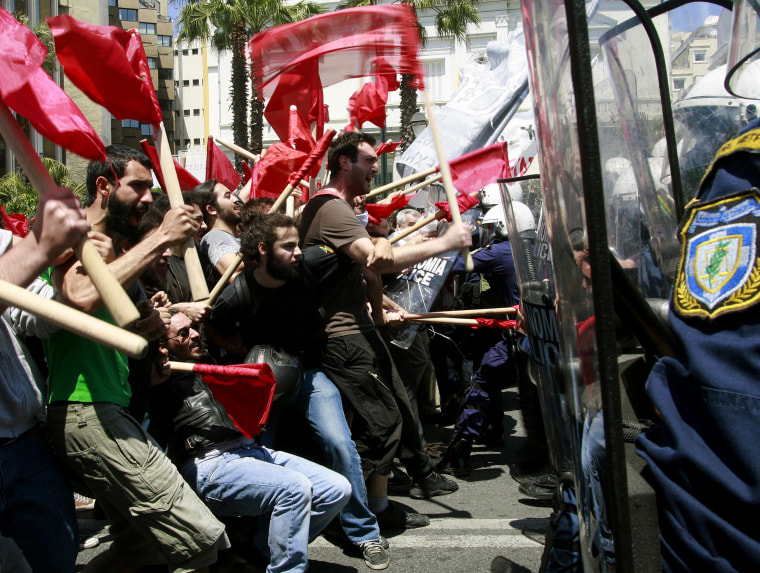In early 2011, when Governor Scott Walker of Wisconsin introduced legislation designed to severely weaken public employee unions, New York Times columnist Paul Krugman wrote that "the shock doctrine is on full display." The shock doctrine—a concept coined by Naomi Klein, in her book of the same name—refers to the practice of imposing radical laissez faire reforms on crisis-stricken economies. In the case of Wisconsin, Walker, a Republican, used a budget crisis of his own creation as an excuse to eviscerate the collective bargaining rights of public employees, even though doing so left the budget unaffected. As with every shock doctrine program, Walker's plan had little to do with solving the immediate crisis, and everything to do with furthering an anti-government ideological agenda.
Now there's evidence to suggest that economic policymakers in Europe are attempting a similar move in crisis-stricken EU member states. Whatever their intentions, history suggests that the consequences could be disastrous.
As Ezra Klein noted in his must-see two-minute primer on the European debt crisis for The Rachel Maddow Show, the European Central Bank (ECB) has the power to devalue the Euro or cut interest rates, which would make it far easier for countries like Greece and Spain to pay off their debts. But it won't.
The ECB's inaction has baffled most observers. After all, moving help cash-strapped nations pay back their creditors would go a long way to alleviating a crisis that has already dragged down Europe's economy and could still deal a major blow to ours, too. Krugman, a Nobel-Prize-winning economist, calls the ECB's passivity "utterly bizarre."
But one other economist has a theory. J.W. Mason, a PhD candidate in economics at the University of Massachusetts and a lecturer at Columbia University, argues that the central bank is using the debt crisis as leverage to reshape local economies across Europe. In other words: The ECB is flatly refusing to ameliorate the crisis until needy countries sign on to the full free-market agenda, by agreeing to liberalize markets, privatize industries, roll back the welfare state, and weaken labor unions.
This isn't necessarily part of some sinister conspiracy. As Mason suggests, the ECB's leaders appear to sincerely believe that removing constraints on the market helps everyone in the long run. That's the position ECB Executive Board Member Jörg Asmussen seems to be representing when he argues, in the characteristically starchy language of high finance, that Greece needs to close its "competitiveness gap" by "[r]educing minimum wages in the private sector, removing rigidities in the wage-setting system," and implementing "liberalisation of product and services markets."
But history tells a different story. This wouldn't be the first time that a central bank has exercised its power to chip away at social democracy. The Reichsbank—Germany's central bank until after World War II—tried something very similar during the Great Depression of the early 1930s. In doing so, the Weimar government needlessly prolonged the depression and inadvertently set the stage for the Nazi Party's rise to power.
The Depression hit Germany's economy hard, but the Reichsbank was in a position to soften the blow. By printing more reichsmarks (the German currency of the time), Chancellor Heinrich Brüning could have prevented massive cuts to public services and stimulated employment. But he refused to do so.
Why? During the early 1920s, Germany had seen crippling hyper-inflation brought on by reparations payments it was forced to make after World War One, and Bruning was nervous that printing money could once more cause prices to spiral. But Brüning also had a more explicitly ideological agenda: He wanted to get rid of parliamentary democracy and social programs it had ushered in, reinstating the kind of conservative autocracy that had been in place until 1918.
Both the ECB and Brüning, however, faced the same obstacles: leftist political parties, trade unions, and a robust welfare state. As a result, historian Richard J. Evans writes in The Coming of the Third Reich, Brüning "hoped to use the continuing high unemployment rate to complete his dismantling of the Weimar welfare state, reduce the influence of labour and thus weaken the opposition to the plans he was now concocting to reform the constitution in an authoritarian, restorationist direction."
Brüning never got what he wanted. By allowing economic conditions to worsen, he contributed to the resentment, disaffection and distrust in Weimar governance that drove more voters to the Nazi Party. By 1933, Hitler had become Chancellor, rendered the German parliament powerless, and brought about the end of the Republic.
Today, there's no Hitler on the horizon in European debtor states—but there are troubling signs of a resurgence on the extreme right. The neo-fascist Golden Dawn party has established a sturdy foothold in the Greek parliament, despite a shocking act of televised political violence from one of its representatives. And continued turmoil in Greece can only benefit Golden Dawn and its ilk further. Political extremism aside, by standing pat rather than address the crisis, ECB policymakers are prolonging the Greeks' economic misery—not to mention increasing the chances that the crisis could spread throughout Europe and beyond.
Brüning's mistake was to commit an act of massive political hubris: When he had the opportunity to alleviate a humanitarian crisis, he instead attempted to harness it and reshape an entire country. Crises, however, are not so easily harnessed. Make the attempt, and you court the possibility of making things much, much worse. Even if the rising tide of right-wing nationalism breaks, Europe's financial elites must set aside free market fundamentalism if they hope to avoid deepening the continent's economic, political, and humanitarian devastation.
